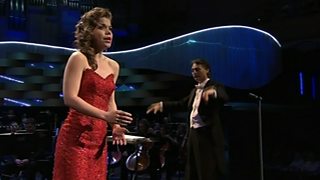Ukraine: Olena Tokar
Soprano - born 1987
Olena Tokar studied at the Tchaikovsky National Music Academy in Kiev and the Hochschule für Musik und Theater, Leipzig, with Professor Regina Werner Dietrich. In 2010 she was a finalist in the Ferruccio Tagliavini International Competition for Opera Singers in Deutschlandsberg. In 2012 she won the ARD International Music Competition in Munich, the Lortzing Competition in Leipzig and was a finalist in the Francisco Viñas International Singing Competition, Barcelona.
An ensemble member of Oper Leipzig since the 2009/10 season, Olena’s roles include Gretel, Taumännchen and Sandmännchen Hänsel und Gretel, Papagena Die Zauberflöte, Antigona in Handel’s Admeto, re di Tessaglia, Smeraldine L'amour des trois oranges, Zemina Die Feen, Rahel Nabucco, Berta Il barbiere di Siviglia and Blumenmädchen Parsifal.
In 2011 Olena took part in the Young Singers Project at the Salzburger Festspiele, working with artists including Ileana Cotrubas, Christa Ludwig, Michael Schade and Alfred Brendel, culminating in a gala concert with the Salzburg Mozarteum Orchestra under the baton of Ivor Bolton.
Forthcoming engagements include the title role in Pierangelo Valtinoni’s Pinocchio, Musetta La bohème, Gretel Hänsel und Gretel, Pamina Die Zauberflöte and Röschen �ٴǰ���ö�������� for Oper Leipzig.
- Winner of Concert Three
- Song Prize finalist
- Finalist
Final repertoire
Ach, ich fühl's (Die Zauberflöte) Mozart
Pamina, unaware that her lover Tamino has been placed under a vow of silence as part of an ordeal, thinks his silence means he no longer loves her. Heartbroken, she sings this plaintive aria, saying she does not want to go on living if he will not speak to her.
Quando me'n vo' (La bohème) Puccini
Musetta makes her entrance at the Café Momus on the arm of a wealthy admirer. She tries to attract the attention of her occasional boyfriend, Marcello, by singing of the admiring looks she receives from all wherever she goes. Musetta enjoys this power and knows that Marcello desires her, although he is trying to ignore her.
Song to the Moon (Rusalka) Dvořák
Rusalka is a water-nymph, the daughter of the Spirit of the Lake. In a lakeside glade, she sings to the moon of her love for a mortal, the prince who came to the lake to bathe. She longs to become mortal, but a Water Goblin has warned her of the dangers. She tells the moon of her love.
O, Dieu!... Ah! Je ris (Faust) Gounod
Marguérite has found a casket of jewels, and tries them on in the mirror. Now she is as lovely as a princess. She thinks that Faust would now find her truly beautiful, if he could only see her.
Song Prize Final repertoire
Kaddish (Deux mélodies hébraïques) – Ravel
Kaddish is a doxology, a form of thanksgiving and prayer recited at funerals, praising God and proclaiming his kingdom. Ravel composed his setting of the Hebrew words in 1914.
Tell me (Op 7 No 12) - Viktor Kosenko
The singer begs his beloved to talk to him. He loves to hear her voice when they are alone together at dusk. Her face glows as she speaks and he wants to think of nothing else.
A Dream (Op 38 No 5) – Rakhmaninov
It is wonderful to dream. A dream has magical stillness – no emotions but many pleasures. The dream has huge wings, as light as a shadow, hovering silently and effortlessly. The poem is by Fyodor Sologoub.
Liebeslied (Op 51 No 5) – Schumann
In this song of unrequited love, the poet’s heart longs to open to her beloved. Everything else is as nothing if she cannot be with him. She will devote her life to loving him even though she can never hold him in her arms. The poem is by Goethe.
The Nightingale and the Rose (Oriental Romance) - Rimsky-Korsakov
The nightingale tries to woo the rose with his song, but she takes no notice; A lover serenades his lady with a song full of pain and hope and she does not even realise that his song is for her. This is a setting of words by Aleksey Koltsov.
Tell me, what in the shade of the branches? (Op 57 No 1) - Tchaikovsky
The poet asks what the nightingale is singing about, there in the tree? What is his song about? Of course, love! What does the girl dream about, that brings her joy and fear in her sleep? Of course, she is waiting for love! What delights your heart although you are full of anguish from life’s sorrow? Of course, the memory of when you first heard the word ‘love’! The text is by Fyodor Sologub.
��
Widmung (Op 25 No 1) – Schumann
Lied der Suleika (Op 25 No 9) – Schumann
Schilflied (Op 71 No 4) – Mendelssohn
Daisies (Op 38 No 3) – Rakhmaninov
Frenzied Nights (Op 60 No 6) – Tchaikovsky
Serenade (Op 63 No 6) – Tchaikovsky
Piangerò la sorte mia (Giulio Cesare) – Handel
Cleopatra believes that the battle is over and that Caesar is dead. In this famous aria, set to a quatrain, she mourns with great bitterness and promises that when she is dead she will become a ghost and haunt the enemy night and day.
Temerari...Come scoglio (Così fan tutte) – Mozart
Fiordiligi and her sister Dorabella are being wooed by two strangers, who are actually their lovers in disguise. Fiordiligi, the more strong-minded of the sisters, delivers this strong diatribe on fidelity, saying that she will remain firm as a rock in her loyalty, despite all temptations.
Glück, das mir verblieb (Die tote Stadt) – Korngold
Korngold wrote ‘The Dead City’ in 1920 when the theme of coming to terms with the loss of a loved one resonated with audiences who had suffered through the First World War. This aria is sung by Marietta, a dancer who has been mistaken by a grieving husband for his dead wife. She tells him that the joys of true love never die.
























